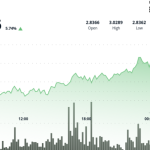NYDIG: Increased SEC Position Limits Could Bolster BlackRock’s Lead in Bitcoin ETF
Crypto financial services firm NYDIG suggests the Securities and Exchange Commission’s (SEC) decision to raise position limits for Bitcoin ETFs could further cement BlackRock’s market-dominating iShares Bitcoin Trust ETF (IBIT), the company reported Friday.
The SEC on Tuesday increased the number of allowed options contracts from 25,000 to 250,000 “for all ETFs with options,” including IBIT but excluding Fidelity’s Fidelity Wise Origin Bitcoin Fund (FBTC), according to NYDIG Global Head of Research, Greg Cipolaro.
Speaking specifically to IBIT and FBTC, Cipolaro stated, “The change is likely to widen the monstrous lead that IBIT already has over the other players, while it hobbles FBTC’s position as the second-largest options player.” Balance sheets from CoinGlass show IBIT holds $85.5 billion in assets, over four times FBTC’s $21.35 billion.
Suppression of Volatility Expected
Cipolaro analyzed the likely broader market impact, concluding that the augmented limits would likely suppress Bitcoin (BTC) volatility.
He noted, “This change enables more aggressive implementation of options strategies, like covered call selling,” a tactic limiting downside but also gains. Furthermore, “a lower volatility makes Bitcoin appealing on a risk-parity basis,” potentially attracting institutional capital.
He elaborated, “The feedback loop of falling volatility leading to increased spot buying could become a powerful driver of sustained demand,” linking suppressed volatility to increased buying interest.
Market Structure Shifts Announced
Adding to Tuesday’s regulatory announcements, the SEC approved in-kind creation and redemption for approved crypto ETFs, allowing shares to be exchanged for the underlying Bitcoin via asset managers rather than cash.
Cipolaro highlighted this feature as “a key feature” requested by ETF issuers, predicting significant impacts on “market structure and investor access.”
Addressing a potential short-term challenge, Cipolaro observed that some Authorized Participants (APs), financial institutions responsible for ETF creation and redemption, lack crypto trading capabilities and “will likely not be able to take advantage of arbitrage activities and offer competitive pricing.” He noted that only two APs, Jane Street and Virtu, possess the paired crypto trading capabilities needed for arbitrage.












